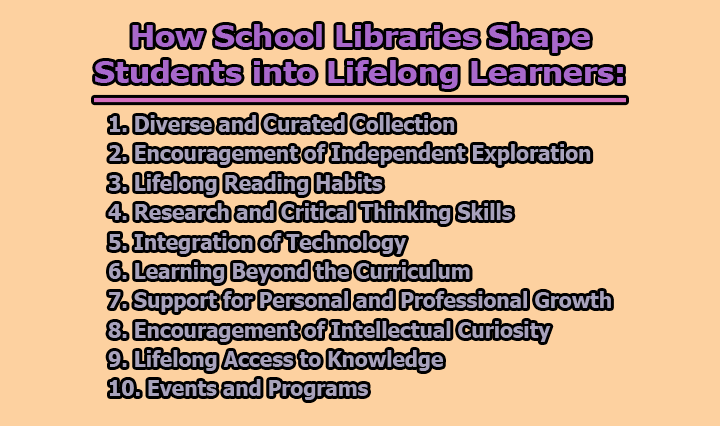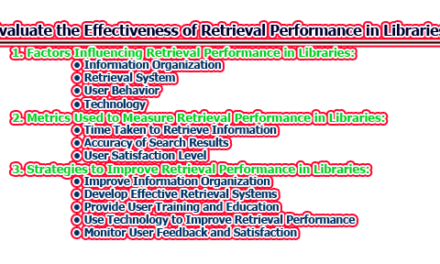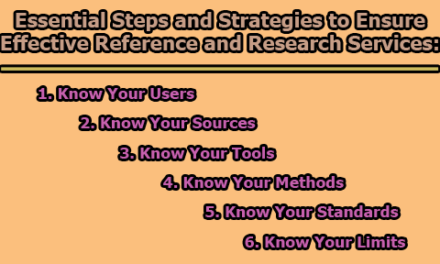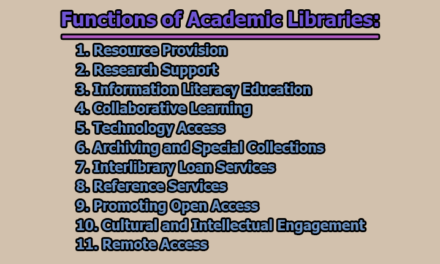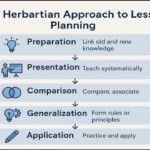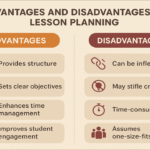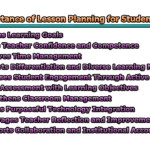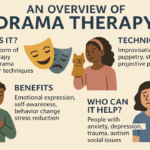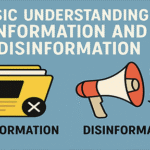How School Libraries Shape Students into Lifelong Learners:
The school library is like a guidepost of knowledge and discovery in the academic world, providing students with a safe space where curiosity and imagination can flourish. Situated amidst the busy hallways and classrooms, the library serves as a peaceful retreat where the magic of written words comes to life, and intellectual adventures begin. More than just neatly arranged books, the library is a portal to information, encouraging a culture of continuous learning and thoughtful analysis. With its variety of resources, friendly atmosphere, and crucial support for academic endeavors, the school library stands as a vital hub for students, teachers, and the entire learning community. In the rest of this article, we will explore school library, benefits of a school library, and how school libraries shape students into lifelong learners.
What is a School Library?
A school library is a designated space within an educational institution specifically dedicated to providing students, teachers, and staff access to various resources for learning, research, and leisure. It serves as a central hub for information dissemination and plays a crucial role in promoting literacy, intellectual growth, and the development of critical thinking skills among students.
Typically, a school library is equipped with a diverse collection of materials, including books, magazines, journals, and digital media, covering a wide range of subjects and interests. These resources are carefully curated to support the curriculum and academic goals of the school. The library is not just a repository of books; it is a dynamic space that fosters a love for reading, exploration, and learning.
In addition to its physical resources, a school library often offers various services to enhance the educational experience. This may include research assistance, providing technology access for online research and projects, and organizing educational programs or events. The goal is to create an environment where individuals can explore, discover, and engage with knowledge in a supportive and enriching manner.
As a fundamental component of the educational ecosystem, a school library plays a pivotal role in shaping the intellectual and academic development of students. It goes beyond being a mere collection of books; it is a vital resource that empowers individuals to become lifelong learners, critical thinkers, and informed members of the academic community.
Benefits of a School Library:
The school library stands as a crucial oasis of learning within any educational institution, offering a myriad of benefits that extend well beyond its physical space. Its advantages are profound and far-reaching, shaping students’ academic endeavors and personal growth in various ways.
- Promoting Literacy and a Love for Reading: School libraries serve as captivating hubs where shelves lined with age-appropriate books beckon students to embark on literary adventures. By offering a diverse collection, these libraries create an environment conducive to nurturing not just literacy but a genuine passion for reading that extends well beyond academic requirements.
- Fostering Independent Learning and Critical Thinking: Designed as sanctuaries for intellectual exploration, school libraries provide an atmosphere where students can autonomously delve into subjects that spark their curiosity. This encourages the development of critical thinking skills as students navigate a vast array of resources, honing their abilities to question, analyze, and synthesize information.
- Supporting Academic Achievement: School libraries are indispensable allies in the academic journey, offering an extensive collection covering an array of subjects. Librarians, knowledgeable curators of this wealth of information, guide students towards relevant materials, enhancing their understanding and contributing significantly to academic success.
- Fostering a Sense of Community and Inclusivity: Beyond their role as repositories of knowledge, school libraries function as lively community hubs. Students from diverse backgrounds converge in these spaces, participating in events, book clubs, and discussions. This fosters a sense of inclusivity, encouraging dialogue that broadens perspectives and deepens connections.
- Nurturing Technological Literacy: Evolving with the times, modern school libraries seamlessly integrate technology. Computers, online databases, and e-books become essential tools, equipping students with the technological literacy needed to confidently navigate the digital landscape, a skill crucial in the contemporary world.
- Cultivating Emotional Well-being: School libraries extend beyond academic pursuits, providing a haven where students can retreat from the demands of their studies. This nurturing environment allows students to unwind, read for pleasure, or engage in creative activities, contributing significantly to their emotional well-being.
- Encouraging Creative Expression: Beyond being repositories of knowledge, school libraries inspire creative minds. In addition to educational materials, they often provide platforms for artistic expression through writing, poetry, and artwork. Workshops, contests, and displays organized by the library encourage students to tap into and express their creativity.
- Cultivating Responsible Digital Citizenship: Acknowledging the digital era, school libraries actively engage in educating students about responsible online behavior. Librarians guide discussions on digital ethics, privacy, cyberbullying, and the verification of online information, fostering a generation of responsible digital citizens.
- Bridging Generations and Cultures: School libraries act as unique spaces where students, teachers, and parents converge to share their love for learning. In addition to fostering intergenerational connections, the library’s diverse collection reflects various cultures and perspectives, contributing to an appreciation for global diversity and interconnectedness.
- Offering a Safe and Inclusive Haven: For many students, the school library serves as more than just a study space; it is a sanctuary. Inclusive practices ensure that every student, regardless of background or abilities, feels valued and supported as they embark on their educational journeys.
- Building Lifelong Learning Habits: Central to the mission of school libraries is the cultivation of lifelong learning habits. Exposure to various subjects and interests within the library encourages students to become curious, self-motivated learners beyond the confines of formal education.
- Empowering Student Leadership: School libraries actively involve students in leadership roles. As library assistants, students contribute to the vibrancy of the library, taking on responsibilities that foster a sense of ownership and pride in their role within the broader school community.
- Supporting Special Educational Needs: Inclusive school libraries go the extra mile to cater to students with special educational needs. Offering resources such as audiobooks, large-print materials, and sensory-friendly spaces ensures equitable access to the library’s offerings, reinforcing the principle that education should be accessible to everyone.
- Preparing for Higher Education and Beyond: The skills and values cultivated within the walls of a school library extend far beyond graduation. Proficiency in research, critical thinking, and effective communication acquired through engagement with library resources prepares students for success in higher education and their future careers.
- Enhancing Cultural Appreciation: School libraries are not just repositories of knowledge; they are cultural kaleidoscopes. The diverse collection of materials reflects various cultures and perspectives, fostering an appreciation for global diversity and interconnectedness. This exposure prepares students to navigate an increasingly interconnected world with cultural sensitivity and awareness.
The benefits of a school library are multifaceted and enduring. As educational institutions evolve, the school library remains a steadfast cornerstone of learning and growth, empowering students to excel academically and navigate the complexities of the information age with confidence and wisdom.
How School Libraries Shape Students into Lifelong Learners:
The school library stands as a dynamic hub, playing a pivotal role in shaping students into lifelong learners. Here’s an exploration of how school libraries contribute to fostering a culture of continuous learning among students:
1. Diverse and Curated Collection: A well-stocked school library boasts a rich assortment of resources, from traditional books and magazines to e-books, audiobooks, and digital materials. This diversity exposes students to a broad spectrum of ideas, perspectives, and knowledge, instilling a curiosity-driven approach to learning that goes beyond their immediate interests.
2. Encouragement of Independent Exploration: The library provides a dedicated space for students to explore topics of personal interest, fostering independent research and discovery. Through self-directed learning, students develop essential skills such as seeking out information, evaluating sources, and engaging in meaningful exploration beyond the confines of the classroom.
3. Lifelong Reading Habits: By offering a plethora of reading materials, the library contributes to the cultivation of a lifelong love for reading. When students engage with books for pleasure, they enrich their imagination and continue learning through reading long after their formal education has concluded.
4. Research and Critical Thinking Skills: Librarians play a crucial role in guiding students to navigate the library’s resources effectively. Through this guidance, students learn to locate reliable information, critically assess sources, and synthesize knowledge. These skills transcend academia, empowering students to approach new challenges with a discerning and informed mindset.
5. Integration of Technology: Modern libraries embrace technology, providing access to online databases, digital archives, and research tools. By exposing students to digital resources, the library equips them with essential skills for navigating the digital landscape—a crucial component of lifelong learning in the modern era.
6. Learning Beyond the Curriculum: The library exposes students to a wealth of information beyond the scope of their curriculum. This exposure encourages them to explore topics that intrigue them, deepening their understanding of the world and fostering a passion for continuous learning.
7. Support for Personal and Professional Growth: As students transition into adulthood, the library remains a valuable resource for personal and professional growth. Whether learning new skills, staying updated on industry trends, or pursuing hobbies, the library’s collection and guidance continue to play a significant role in their ongoing education.
8. Encouragement of Intellectual Curiosity: The library cultivates intellectual curiosity through its myriad resources. By encouraging students to ask questions, seek answers, and engage in meaningful discussions, the library fosters a mindset of inquiry that extends far beyond their academic years.
9. Lifelong Access to Knowledge: The library imparts the understanding that learning has no expiration date. Students come to realize that the library is a reliable source for up-to-date information, making it an enduring ally throughout their lives.
10. Events and Programs: Many school libraries organize a variety of events, workshops, book clubs, and lectures that actively promote ongoing learning. These activities provide students with opportunities to engage with new ideas, connect with peers who share similar interests, and expand their horizons in a supportive and intellectually stimulating environment.
In essence, the school library lays the foundation for a lifelong love of learning by fostering curiosity, critical thinking, and the skills needed to explore and engage with the world throughout one’s life journey. The library emerges not just as a repository of knowledge but as a dynamic catalyst for continuous intellectual growth and exploration.
Frequently Asked Questions (FAQs):
Why is a school library important?
A school library is crucial as it provides a dedicated space for students to access a diverse range of resources, fostering a love for reading, supporting academic studies, and promoting lifelong learning.
What resources are available in a school library?
School libraries typically offer books, magazines, journals, e-books, audiobooks, digital media, and sometimes even technology resources like computers. The resources cover various subjects to support the curriculum and cater to diverse interests.
How does a school library contribute to academic success?
A school library supports academic success by providing students with additional resources for research, study materials, and guidance from librarians. It enhances their understanding of subjects and helps with assignments and projects.
Are school libraries only for academic purposes?
No, school libraries serve a multifaceted role. While supporting academics is a primary function, they also encourage leisure reading, foster a sense of community, and provide a space for various activities such as workshops, book clubs, and events.
What role do librarians play in a school library?
Librarians are integral to a school library as they assist students and teachers in finding relevant resources, guide research efforts, organize events, and promote information literacy. They play a crucial role in creating a vibrant and resourceful library environment.
How can a school library encourage a love for reading?
School libraries promote a love for reading by offering a diverse collection of books suitable for various age groups and interests. Creating a comfortable reading environment, organizing reading programs, and recommending books also contribute to fostering this love.
How does a school library adapt to technological advancements?
Modern school libraries integrate technology by providing access to online databases, e-books, and digital resources. They often have computers for research and may organize workshops to enhance students’ digital literacy skills.
Can parents get involved in the school library?
Yes, parents can get involved by volunteering, participating in library events, and supporting their children’s reading habits. Some school libraries also have parent-teacher-library associations to facilitate collaboration.
How does a school library contribute to students’ emotional well-being?
A school library contributes to emotional well-being by providing a quiet and comfortable space for students to relax, read for pleasure, or engage in creative activities. It serves as a refuge from academic stress and promotes a positive atmosphere.
How does a school library support diverse learning needs?
Inclusive school libraries often provide resources tailored to students with diverse learning needs, such as audiobooks, large-print materials, and sensory-friendly spaces. Librarians play a role in ensuring equitable access to resources for all students.

Assistant Teacher at Zinzira Pir Mohammad Pilot School and College

